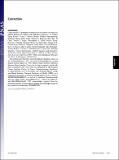Lipopeptide nanoparticles for potent and selective siRNA delivery in rodents and nonhuman primates
Author(s)
Dong, Yizhou; Love, Kevin T.; Dorkin, Joseph Robert; Sirirungruang, Sasilada; Zhang, Yunlong; Chen, Delai; Bogorad, Roman; Yin, Hao; Chen, Yi; Vegas, Arturo; Alabi, Christopher A.; Sahay, Gaurav; Olejnik, Karsten; Wang, Weiheng; Schroeder, Avi; Lytton-Jean, Abigail K. R.; Siegwart, Daniel J.; Akinc, Akin; Barnes, Carmen; Barros, Scott A.; Carioto, Mary; Fitzgerald, Kevin; Hettinger, Julia; Kumar, Varun; Novobrantseva, Tatiana I.; Qin, June; Querbes, William; Kotelianski, Victor E.; Langer, Robert; Anderson, Daniel Griffith; ... Show more Show less
DownloadDong-2014-Lipopeptide nanopart.pdf (1.276Mb)
PUBLISHER_POLICY
Publisher Policy
Article is made available in accordance with the publisher's policy and may be subject to US copyright law. Please refer to the publisher's site for terms of use.
Terms of use
Metadata
Show full item recordAbstract
siRNA therapeutics have promise for the treatment of a wide range of genetic disorders. Motivated by lipoproteins, we report lipopeptide nanoparticles as potent and selective siRNA carriers with a wide therapeutic index. Lead material cKK-E12 showed potent silencing effects in mice (ED50 ∼ 0.002 mg/kg), rats (ED50 < 0.01 mg/kg), and nonhuman primates (over 95% silencing at 0.3 mg/kg). Apolipoprotein E plays a significant role in the potency of cKK-E12 both in vitro and in vivo. cKK-E12 was highly selective toward liver parenchymal cell in vivo, with orders of magnitude lower doses needed to silence in hepatocytes compared with endothelial cells and immune cells in different organs. Toxicity studies showed that cKK-E12 was well tolerated in rats at a dose of 1 mg/kg (over 100-fold higher than the ED50). To our knowledge, this is the most efficacious and selective nonviral siRNA delivery system for gene silencing in hepatocytes reported to date.
Date issued
2014-02Department
Massachusetts Institute of Technology. Institute for Medical Engineering & Science; Massachusetts Institute of Technology. Department of Biology; Massachusetts Institute of Technology. Department of Chemical Engineering; Koch Institute for Integrative Cancer Research at MITJournal
Proceedings of the National Academy of Sciences
Publisher
National Academy of Sciences (U.S.)
Citation
Dong, Y., K. T. Love, J. R. Dorkin, S. Sirirungruang, Y. Zhang, D. Chen, R. L. Bogorad, et al. “Lipopeptide Nanoparticles for Potent and Selective siRNA Delivery in Rodents and Nonhuman Primates.” Proceedings of the National Academy of Sciences 111, no. 11 (February 10, 2014): 3955–3960.
Version: Final published version
ISSN
0027-8424
1091-6490